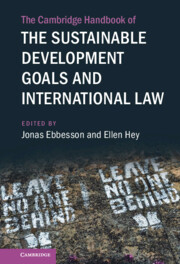Book contents
- The Cambridge Handbook of the Sustainable Development Goals and International Law
- The Cambridge Handbook of the Sustainable Development Goals and International Law
- Copyright page
- Contents
- Contributors
- Preface
- Abbreviations
- Introduction: The Sustainable Development Goals, Agenda 2030, and International Law
- 1 SDG 1: End Poverty in All Its Forms Everywhere
- 2 SDG 2: End Hunger, Achieve Food Security and Improved Nutrition and Promote Sustainable Agriculture
- 3 SDG 3: Ensure Healthy Lives and Promote Well-Being for All at All Ages
- 4 SDG 4: Ensure Inclusive and Equitable Quality Education and Promote Lifelong Learning Opportunities for All
- 5 SDG 5: Achieve Gender Equality and Empower All Women and Girls
- 6 SDG 6: Ensure Availability and Sustainable Management of Water and Sanitation for All
- 7 SDG 7: Ensure Access to Affordable, Reliable, Sustainable and Modern Energy for All
- 8 SDG 8: Promote Sustained, Inclusive and Sustainable Economic Growth, Full and Productive Employment and Decent Work for All
- 9 SDG 9: Build Resilient Infrastructure, Promote Inclusive and Sustainable Industrialization and Foster Innovation
- 10 SDG 10: Reduce Inequality within and among Countries
- 11 SDG 11: Make Cities and Human Settlements Inclusive, Safe, Resilient and Sustainable
- 12 SDG 12: Ensure Sustainable Consumption and Production Patterns
- 13 SDG 13: Take Urgent Action to Combat Climate Change and Its Impacts
- 14 SDG 14: Conserve and Sustainably Use the Oceans, Seas and Marine Resources for Sustainable Development
- 15 SDG 15: Protect, Restore and Promote Sustainable Use of Terrestrial Ecosystems, Sustainably Manage Forests, Combat Desertification, and Halt and Reverse Land Degradation and Halt Biodiversity Loss
- 16 SDG 16: Promote Peaceful and Inclusive Societies for Sustainable Development, Provide Access to Justice for All and Build Effective, Accountable and Inclusive Institutions at All Levels
- 17 SDG 17: Strengthen the Means of Implementation and Revitalize the Global Partnership for Sustainable Development
- Index
9 - SDG 9: Build Resilient Infrastructure, Promote Inclusive and Sustainable Industrialization and Foster Innovation
Published online by Cambridge University Press: 23 September 2022
- The Cambridge Handbook of the Sustainable Development Goals and International Law
- The Cambridge Handbook of the Sustainable Development Goals and International Law
- Copyright page
- Contents
- Contributors
- Preface
- Abbreviations
- Introduction: The Sustainable Development Goals, Agenda 2030, and International Law
- 1 SDG 1: End Poverty in All Its Forms Everywhere
- 2 SDG 2: End Hunger, Achieve Food Security and Improved Nutrition and Promote Sustainable Agriculture
- 3 SDG 3: Ensure Healthy Lives and Promote Well-Being for All at All Ages
- 4 SDG 4: Ensure Inclusive and Equitable Quality Education and Promote Lifelong Learning Opportunities for All
- 5 SDG 5: Achieve Gender Equality and Empower All Women and Girls
- 6 SDG 6: Ensure Availability and Sustainable Management of Water and Sanitation for All
- 7 SDG 7: Ensure Access to Affordable, Reliable, Sustainable and Modern Energy for All
- 8 SDG 8: Promote Sustained, Inclusive and Sustainable Economic Growth, Full and Productive Employment and Decent Work for All
- 9 SDG 9: Build Resilient Infrastructure, Promote Inclusive and Sustainable Industrialization and Foster Innovation
- 10 SDG 10: Reduce Inequality within and among Countries
- 11 SDG 11: Make Cities and Human Settlements Inclusive, Safe, Resilient and Sustainable
- 12 SDG 12: Ensure Sustainable Consumption and Production Patterns
- 13 SDG 13: Take Urgent Action to Combat Climate Change and Its Impacts
- 14 SDG 14: Conserve and Sustainably Use the Oceans, Seas and Marine Resources for Sustainable Development
- 15 SDG 15: Protect, Restore and Promote Sustainable Use of Terrestrial Ecosystems, Sustainably Manage Forests, Combat Desertification, and Halt and Reverse Land Degradation and Halt Biodiversity Loss
- 16 SDG 16: Promote Peaceful and Inclusive Societies for Sustainable Development, Provide Access to Justice for All and Build Effective, Accountable and Inclusive Institutions at All Levels
- 17 SDG 17: Strengthen the Means of Implementation and Revitalize the Global Partnership for Sustainable Development
- Index
Summary
Sustainable Development Goal (SDG) 9, Industry, Innovation, and Infrastructure, aims to further economic advancement through investment in infrastructure, industrialization, and innovation. Implementing SDG 9, however, requires the realization of complex synergies and careful management of its potential disconnects. Positions about the role of international law in such matters differ significantly and depend on how SDG 9 and international law are conceptualized. Some, for instance, view international law’s trade and investment treaties, complemented by the ‘soft law’ standards developed by international institutions, as instrumental in realizing SDG 9’s synergies. Others view international law’s environmental and human rights treaties, and the environmental, social, and governance (ESG) standards developed by international institutions, as paramount to manage the disconnects of SDG 9. The emergence of an ‘ESG normative space’ – involving state and non-state actors in norm creation, application, enforcement, and development – might provide an opportunity for unpacking and reconciling competing interests and conceptions.
SDG 9, infrastructure, industrialization, innovation, international law, environmental, social and governance (ESG) standards, multilateral development banks (MDBs), development finance operations, intellectual property protection, technology transfer, institutional standard setting, synergies, disconnects
- Type
- Chapter
- Information
- Publisher: Cambridge University PressPrint publication year: 2022



